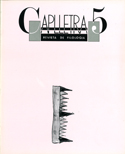La seducció de Gentil en el «Canigó» de Verdaguer i el romanç de «El infante Arnaldos»
DOI:
https://doi.org/10.7203/caplletra.5.7716Keywords:
«Canigó», Jacint Verdaguer, literatura catalana contemporània, romanç de «El infante Arnaldos» Abstract
Abstract
According to Joan Fuster, the Canigó by Jacint Verdaguer is a medieval work in spirit, and totally rooted in old folkloric traditions. This article tries to prove that this is indeed the case by relating Verdaguer's work to the medieval lore on fairies, and to the motif of mortals who are captives in fairyland. It further attempts to show how Verdaguer's over-explaining of tradititonal symbolism could be very useful as a key to the poetic interpretation of more difficult texts such as, for instance, the splendid «romance» of the «infante Arnaldos».
 Downloads
Downloads
Downloads
How to Cite
-
Abstract457
-
PDF (Català)133
Issue
Section
License
Authors submitting work to Caplletra for publication must be the legitimate holder of the usage rights. Legitimacy for the purposes of publishing the work must also include images, tables, diagrams and any other materials that may complement the text, whether they are the author of such material or not.
Copyright: on publishing their work in the journal, the author grants Caplletra. Revista Internacional de Filologia usage rights (reproduction, distribution and public communication) for both the paper printed version and for the electronic version.
All work published in Caplletra is covered by the Creative Commons license type Attribution-NonCommercial-NoDerivatives 4.0 (CC BY-NC-ND 4.0).
RESPONSABILITY
Caplletra. Revista Internacional de Filologia does not necessarily identify with the points of view expressed in the papers it publishes.
Caplletra. Revista Internacional de Filologia accepts no responsibility whatsoever for any eventual infringement of intellectual property rights on the part of authors.






